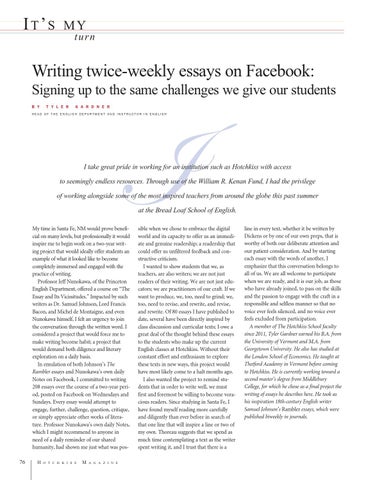144979_8_toc 8/20/14 8:15 AM Page 76
IT’S
MY tur n
Writing twice-weekly essays on Facebook: Signing up to the same challenges we give our students B Y
T Y L E R
G A R D N E R
I
HEAD OF THE ENGLISH DEPARTMENT AND INSTRUCTOR IN ENGLISH
I take great pride in working for an institution such as Hotchkiss with access to seemingly endless resources. Through use of the William R. Kenan Fund, I had the privilege of working alongside some of the most inspired teachers from around the globe this past summer at the Bread Loaf School of English.
My time in Santa Fe, NM would prove beneficial on many levels, but professionally it would inspire me to begin work on a two-year writing project that would ideally offer students an example of what it looked like to become completely immersed and engaged with the practice of writing. Professor Jeff Nunokawa, of the Princeton English Department, offered a course on “The Essay and Its Vicissitudes.” Impacted by such writers as Dr. Samuel Johnson, Lord Francis Bacon, and Michel de Montaigne, and even Nunokawa himself, I felt an urgency to join the conversation through the written word. I considered a project that would force me to make writing become habit; a project that would demand both diligence and literary exploration on a daily basis. In emulation of both Johnson’s The Rambler essays and Nunokawa’s own daily Notes on Facebook, I committed to writing 208 essays over the course of a two-year period, posted on Facebook on Wednesdays and Sundays. Every essay would attempt to engage, further, challenge, question, critique, or simply appreciate other works of literature. Professor Nunokawa’s own daily Notes, which I might recommend to anyone in need of a daily reminder of our shared humanity, had shown me just what was pos-
76
H
O T C H K I S S
M
A G A Z I N E
sible when we chose to embrace the digital world and its capacity to offer us an immediate and genuine readership; a readership that could offer us unfiltered feedback and constructive criticism. I wanted to show students that we, as teachers, are also writers; we are not just readers of their writing. We are not just educators; we are practitioners of our craft. If we want to produce, we, too, need to grind; we, too, need to revise, and rewrite, and revise, and rewrite. Of 80 essays I have published to date, several have been directly inspired by class discussion and curricular texts; I owe a great deal of the thought behind these essays to the students who make up the current English classes at Hotchkiss. Without their constant effort and enthusiasm to explore these texts in new ways, this project would have most likely come to a halt months ago. I also wanted the project to remind students that in order to write well, we must first and foremost be willing to become voracious readers. Since studying in Santa Fe, I have found myself reading more carefully and diligently than ever before in search of that one line that will inspire a line or two of my own. Thoreau suggests that we spend as much time contemplating a text as the writer spent writing it, and I trust that there is a
line in every text, whether it be written by Dickens or by one of our own preps, that is worthy of both our deliberate attention and our patient consideration. And by starting each essay with the words of another, I emphasize that this conversation belongs to all of us. We are all welcome to participate when we are ready, and it is our job, as those who have already joined, to pass on the skills and the passion to engage with the craft in a responsible and selfless manner so that no voice ever feels silenced, and no voice ever feels excluded from participation. A member of The Hotchkiss School faculty since 2011, Tyler Gardner earned his B.A. from the University of Vermont and M.A. from Georgetown University. He also has studied at the London School of Economics. He taught at Thetford Academy in Vermont before coming to Hotchkiss. He is currently working toward a second master’s degree from Middlebury College, for which he chose as a final project the writing of essays he describes here. He took as his inspiration 18th-century English writer Samuel Johnson’s Rambler essays, which were published biweekly in journals.
